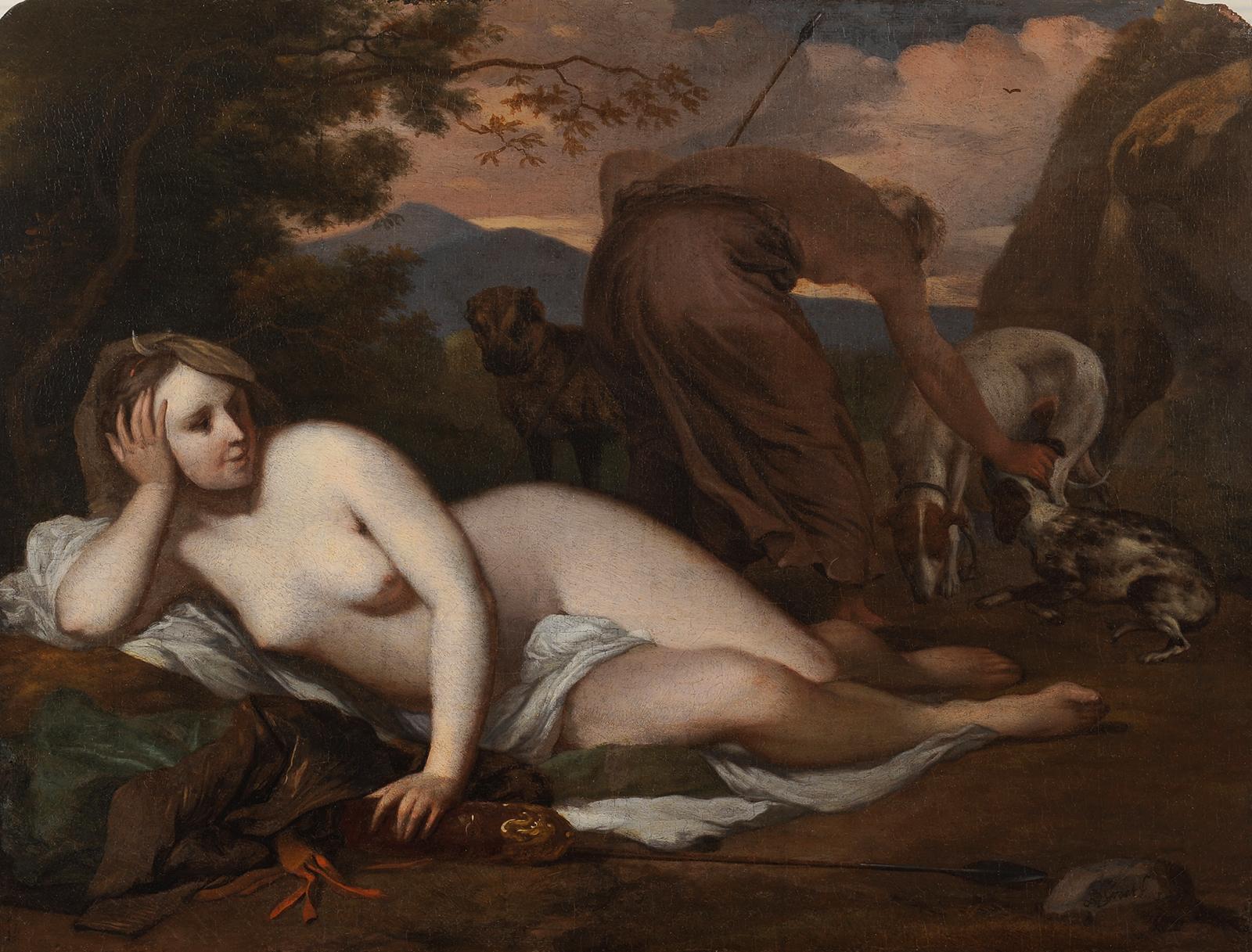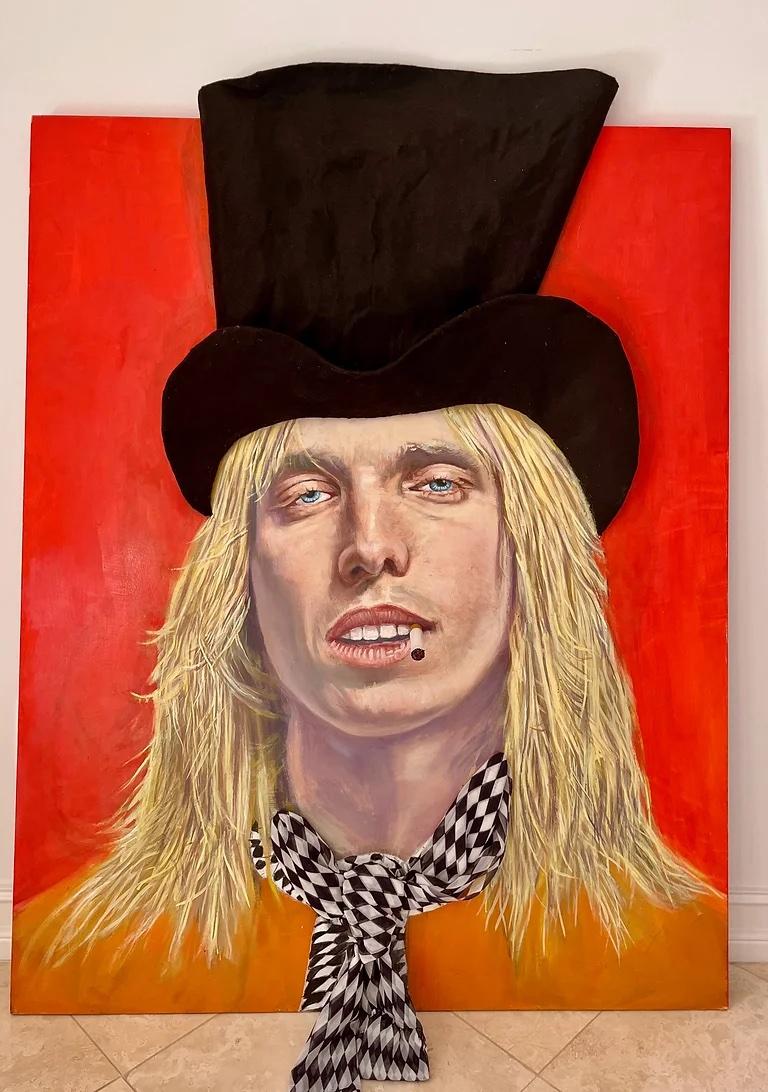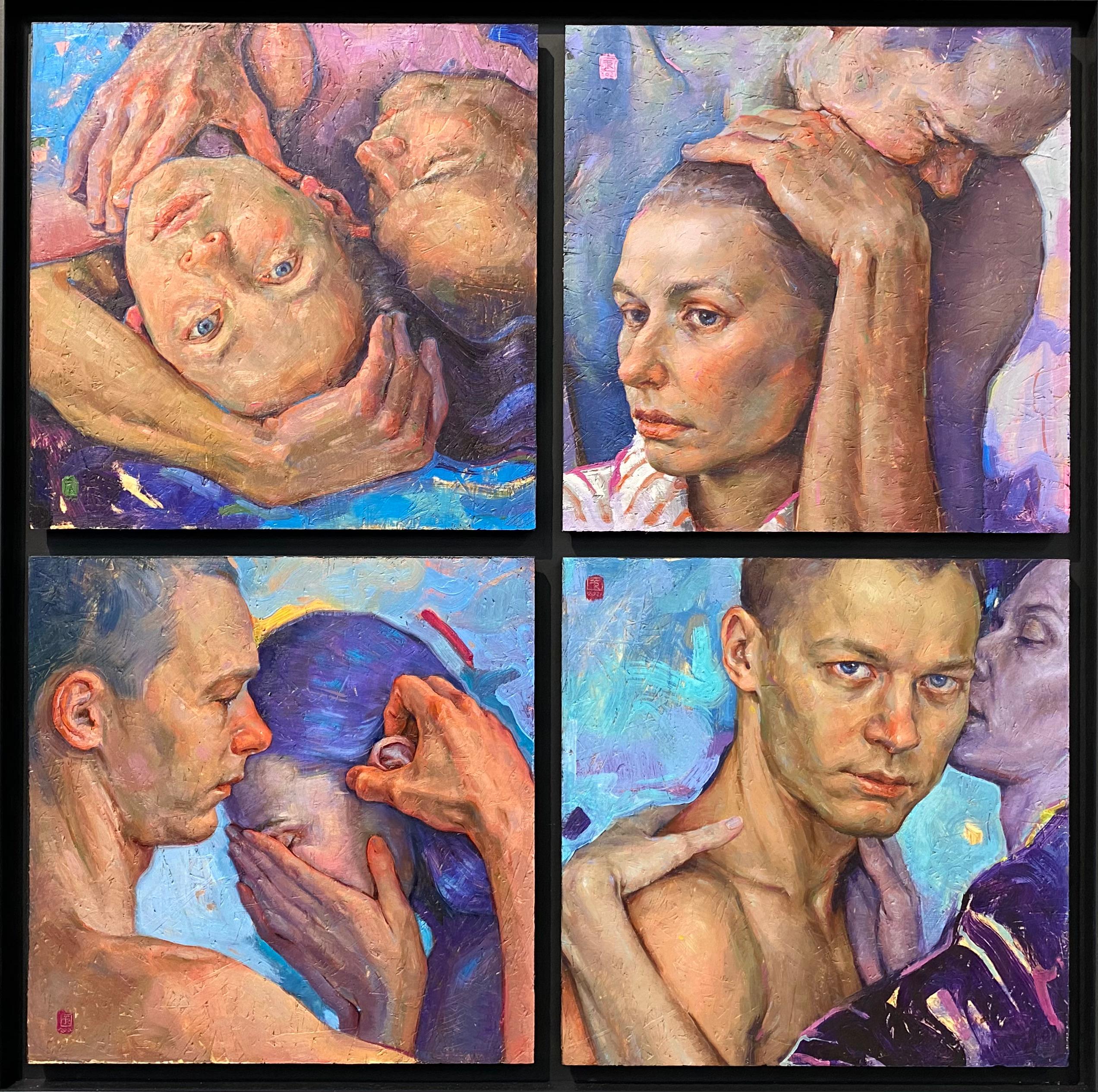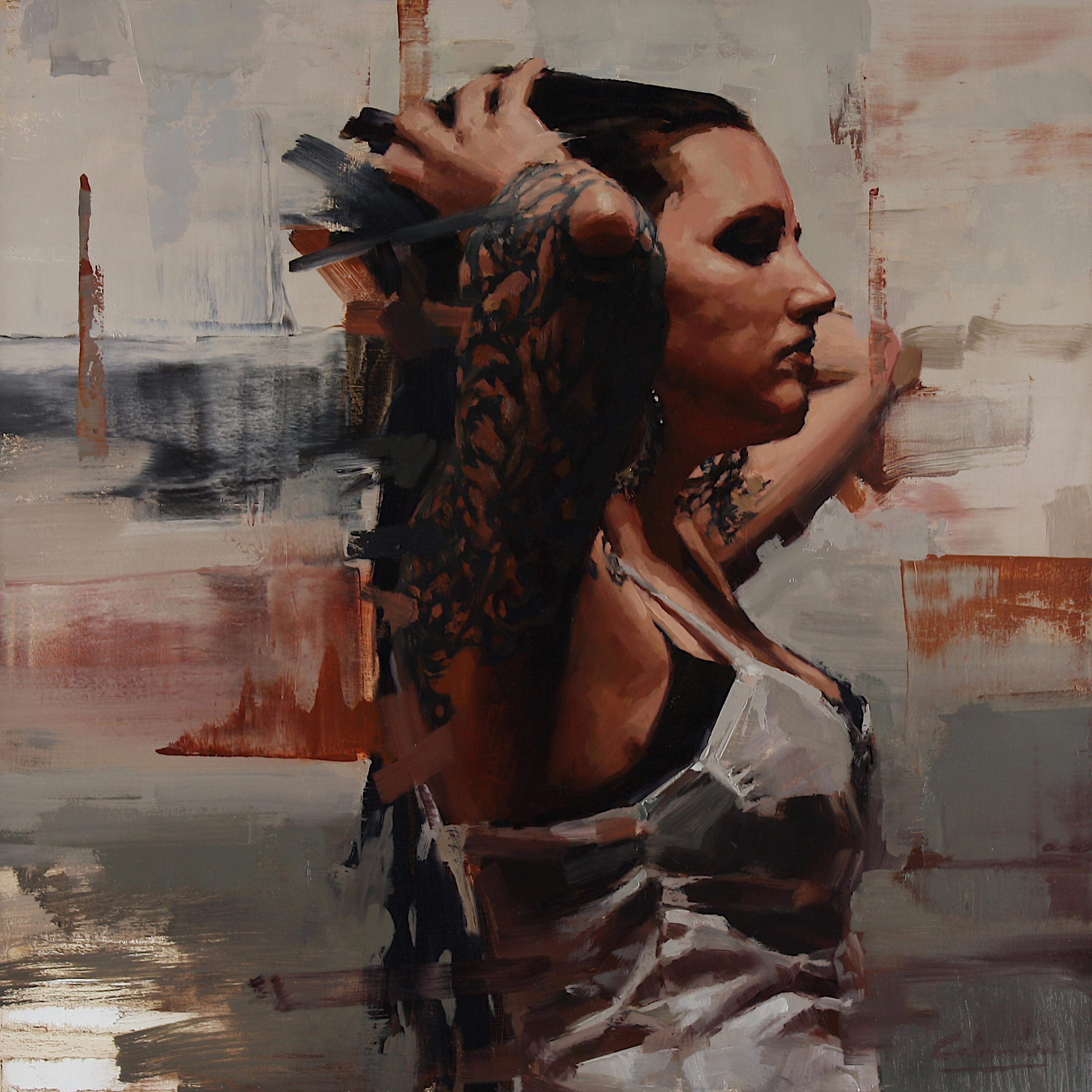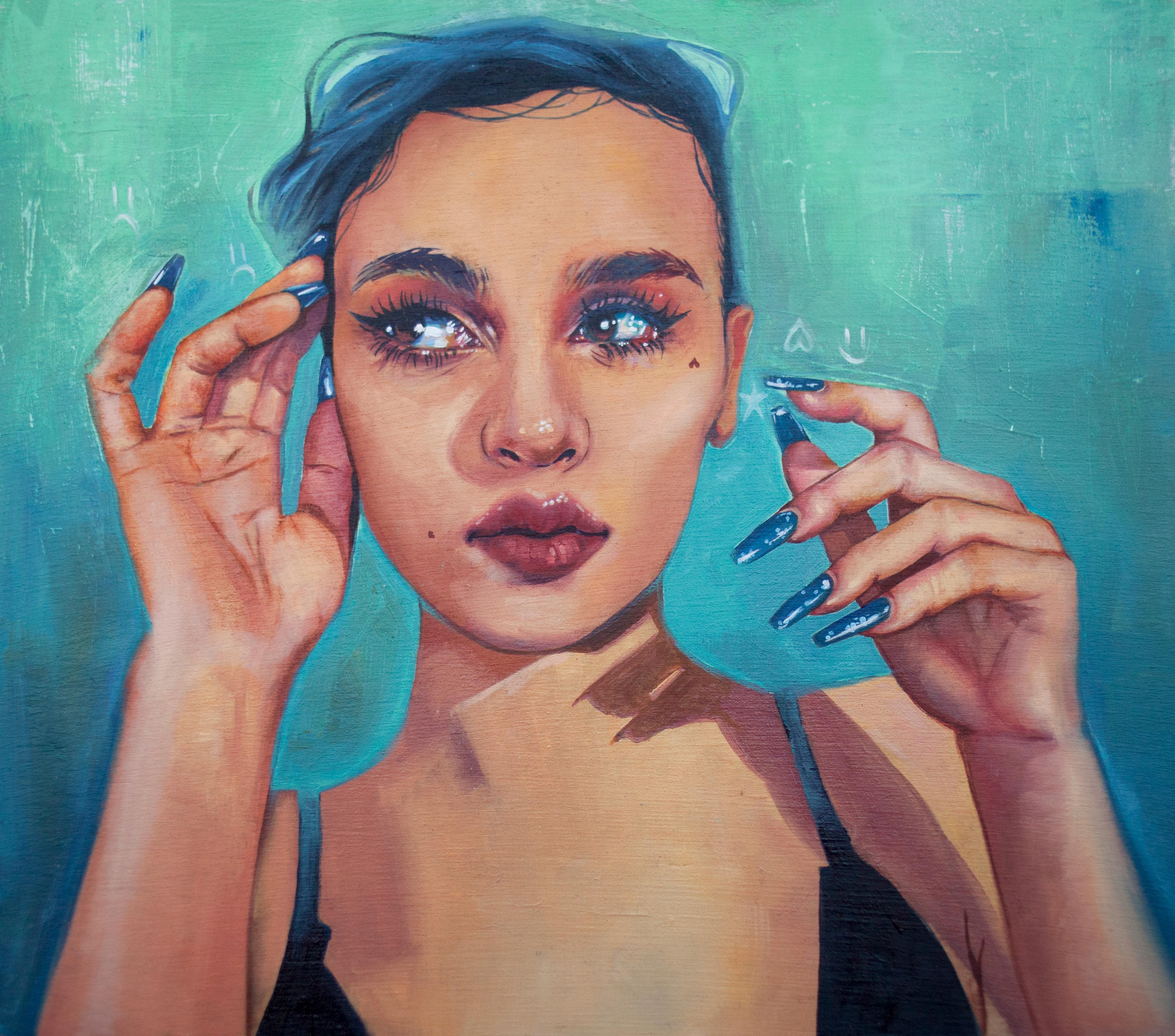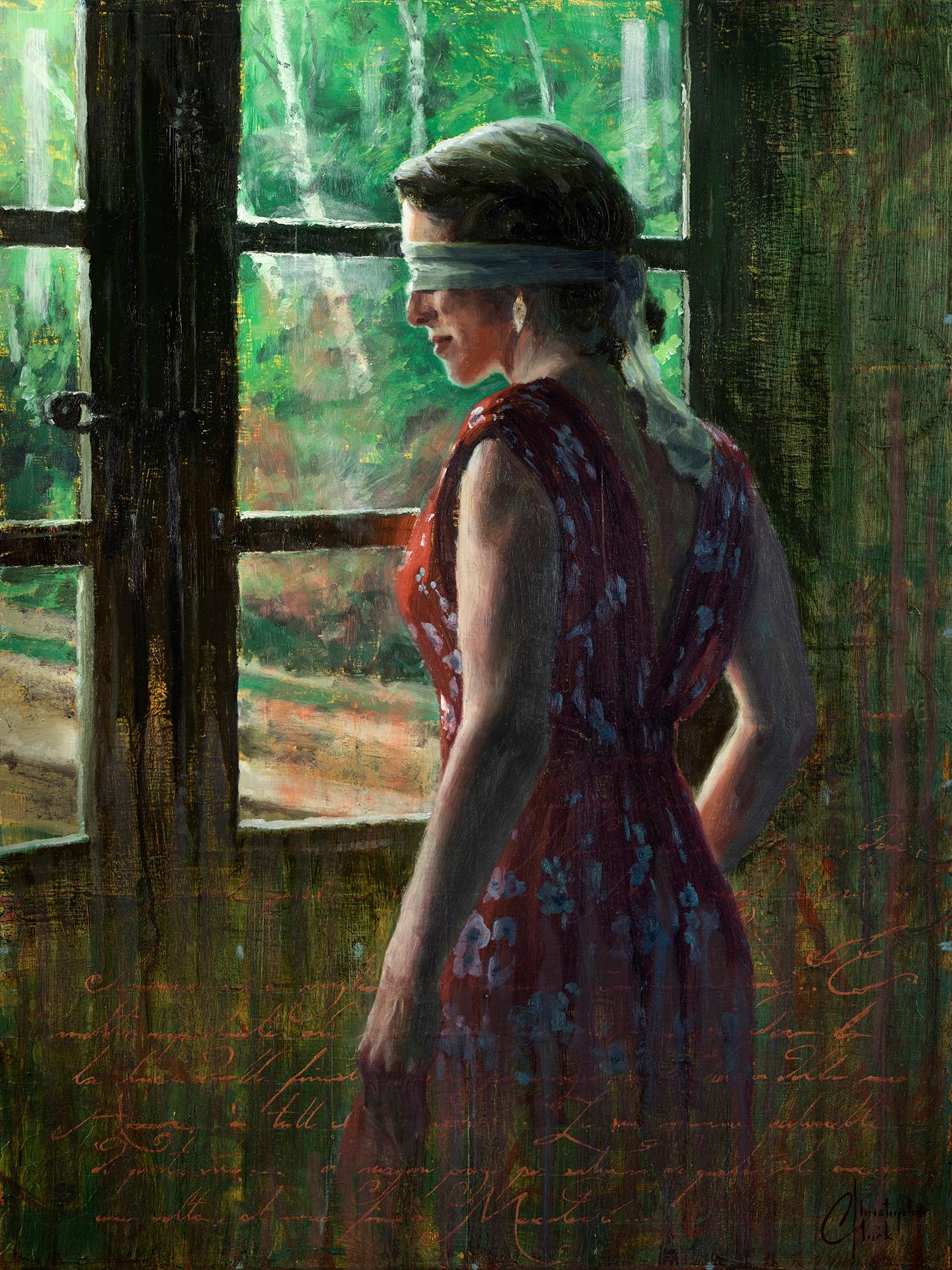Items Similar to King Solomon Worshipping The Idols, 17th Century FRANS FRANCKEN II (1581-1642)
Want more images or videos?
Request additional images or videos from the seller
1 of 11
Frans Francken IIKing Solomon Worshipping The Idols, 17th Century FRANS FRANCKEN II (1581-1642)
About the Item
King Solomon Worshipping The Idols, 17th Century
FRANS FRANCKEN II (1581-1642) - signed sales to $6,000,000
Large 17th Century biblical account of King Solomon worshipping the Idols, oil on panel Frans Francken. Excellent quality and condition Old Testament biblical scene on a cradled panel depicting the Idolatry of Solomon, son and successor of King David. Exceptional detail and would be enhanced with a light clean. Presented in an antique period frame. Signed.
Measurements: 47" x 34" framed approx
Artist Biography
Frans Francken II or the Younger is the third in order of descent in the Francken family tree. Born in 1581, the son of Frans Francken I or the Elder, he was the brother of Thomas, born in 1574, of Hieronymous II, born in 1578 and died in 1623, and of Ambrosius II, the last in line, who died in 1632. Hieronymous II, who died at the age of 56, is only known for his painting Horatius Cocles at Sublicius Bridge. Frans the Younger was initially a pupil of his father, who was then at the height of his career. In his father's studio he imbibed all the teaching of the tradition of Frans Floris. He also spent long periods in Italy, where he familiarised himself in particular with the masters of the Venetian school. Such study in situ enabled him to break away from the well-worn methods of Flemish Italianism, as practised by his father and uncles. It is conceivable that the young artist met Rubens, who was in Italy at the time.
In 1605, at the age of 24, on his return to Antwerp, Frans the Younger became a master in the Antwerp Guild of St Luke. In 1607 he married Elisabeth Placquet in Antwerp. Three sons and eight daughters resulted from this marriage. His children made up the fourth generation in the dynasty. Better known are Frans III (1607-1667) and Hieronymus, born in 1611. The latter had a son, Constantinus (1661-1717), who marks the end of the line. The family of Francken painters runs from 1520 to 1717.
As one of the most active masters in Antwerp, Frans II was appointed dean of the guild in 1614. He was also a member of the Violette, a major literary association, for which he painted an award-winning symbolic coat of arms. He was intimate with the most celebrated artists, in particular van Dyck, who executed a very fine portrait of him, judging by the engraving by Willem Hondius and Pieter de Jode. It is also likely that he was on familiar terms with Rubens who was his near contemporary. He died in Antwerp on 6 May 1642 at the age of 61, outlived by both Rubens and van Dyck.
The first securely dated work of Frans the Younger is Christ on the Cross from the gallery in Vienna, painted in 1606. Witches' Sabbath (Vienna) and The Works of Mercy (Antwerp) are dated 1607 and 1608 respectively. In these two latter works the painter proves himself adept at painting figures and allegorical scenes. The Works of Mercy represents various groups of figures, symbolising the different activities inspired by Christian charity. Paupers and beggars occupy the foreground, the ensemble being dominated by the figure of the glorious Christ.
While Frans the Younger cannot be compared with the masters of this great first generation of Antwerp, which was illuminated and steered by the genius of Rubens, he does nevertheless merit attention. He succeeded in developing and bringing into fashion an anecdotal genre on a more modest scale, elements of which were to inform the last representatives of the Francken family for over a century. Frans the Younger was undoubtedly the most talented draughtsman in the family. While his art may be criticised for its lack of grandeur and solemnity, the execution shows great talent. His brush stroke was vigorous and his imagination, albeit restrained, was brilliant. His interest in tonal values was highlighted by his study and appreciation of his remarkable contemporaries. This enabled him to carry out landscapes and also fleshy figures, which made him altogether worthy of the brilliant period to which he belonged. While detail certainly preoccupied him, he treated it with intelligence and even esprit, as witnessed in The Parable of the Prodigal Son and A Prince's Visit to the Treasury of a Church(both in the Louvre). The scenes painted in grisaille, which surround the principal motif of the Prodigal Son, are characteristic of his style. He excelled in painting jewellery, ornaments, and textiles with shot silk effects. A large number of his figures inhabit the neutral backgrounds of the interiors of apartments and galleries. He carried out such work not only under his own auspices, but also for other artists, such as Peeter Neeffs, van Bassen, Josse de Momper, and Breughel.
Museum and Gallery Holdings
Aix: Arrival of the Hebrews in the Promised Land
Amiens: Adoration of the Magi (sketch)
Amsterdam: Abdication of Charles V of Spain; Adoration of the Magi; The Prodigal Son; Same Subject; Scenes from the Old Testament
Antwerp: A Collector's Cabinet; Miracles at the Tomb of St Bruno; The Works of Mercy; The Four Crowned Martyrs Condemned; Flagellation of the Four Crowned Martyrs; Stoning; The Four Crowned Martyrs at Work
Arras: The Passion
Augsburg: Moses Striking Water from the Rock
Bamberg: The Festival of Dancing
Besançon: The Crossing of the Red Sea; Crossing the Jordan; Christ Delivered to the Insults of the Jews; Christ Carrying the Cross
Bordeaux: Christ at Calvary; Same Subject
Brussels: Croesus Showing Solon his Treasures
Budapest: Esther and Ahasuerus
Caen: The Slaves of the Furies of Love
Chambéry (MBA): Adoration of the Magi
Cherbourg: The Woman Taken in Adultery
Cologne: Adoration of the Magi
Compiègne: Allegory
Dresden: The Calumny of Apelles; The Flight into Egypt; The Queen of the Heavens Crowned with Flowers; The Adultress before Christ; The Creation of Eve
Dunkirk: The Feast of Herod
Florence (Palazzo Pitti): Christ Led to Calvary
Florence (Uffizi): The Flight into Egypt
Hamburg: Drowning of Pharoah's Army
Hanover: The Prodigal Son
Kassel: The Kiss of Judas (copper)
Kassel (Gemäldegal. Alte Meister): Apelles and the Cobbler (copper)
Lille: Christ on the Way to Calvary
Mainz: David, Conqueror of Goliath
Munich: room decorated with pictures and objets d'art; The Seven Works of Mercy; A Tournament
Nancy: The Virgin and Child Served by Angels; Christ in the Desert Served by the Angels
Nantes (MBA): The Embarkation of Cleopatra; The Death of Adonis
Nice: Christ in the Garden of Gethsemane
Oberschleissheim: The Temptation of St Anthony
Oldenburg (Augusteum): Apollo and the Muses
Orléans: Christ before Caiaphus
Oslo: Gathering of Men and Women in front of an Inn
Paris (Louvre): The Parable of the Prodigal Son; The Passion; Ulysses Recognises Achilles amongst the Daughters of Lycomedes; Croesus and Solon
Paris (Mus. Marmottan-Monet): Christ Preaching on the Sea of Tiberias
Rennes: Christ in the House of Simon the Pharisee
Rohrau (Schlossmuseum, Graf Harrach'sche Familiensammlung): Studio (allegorical subject)
Rome (Mus. e Gal. Borghese): Picture Dealer
St Petersburg (Hermitage): Crossing the Red Sea; The Seven Acts of Christian Mercy; Entry of David into Jerusalem
Stockholm: six paintings
Stuttgart: Adoration of the Magi; Last Judgement; The Four Elements; Jupiter and Juno
The Hague: A Ball at the Court of Albert and Isabelle
Tours: The Abduction of Helen
Vienna: Witches' Sabbath; Croesus and Solon; The Dance; The Crucifixion; Christ and Nicodemus; A Cabinet of Art and Curiosities (1636); Gathering of Witches
Bibliography
Härting, Ursula Alice: Studien zur Kabinettbildmalerei des Frans Francken II, 1581-1642. Ein Repräsentativer Werkkatalog, G. Olms, Hildesheim, 1983.
Härting, Ursula Alice: Frans Francken der Jüngere (1581-1642): die Gemälde mit Kritischen Oeuvrekatalog, catalogue raisonné, Luca Verlag, Freren, 1989 (with a summary in English).
- Creator:Frans Francken II (1581 - 1642, Flemish)
- Dimensions:Height: 34 in (86.36 cm)Diameter: 47 in (119.38 cm)
- Medium:
- Period:
- Condition:
- Gallery Location:Blackwater, GB
- Reference Number:
About the Seller
4.8
Platinum Seller
These expertly vetted sellers are 1stDibs' most experienced sellers and are rated highest by our customers.
Established in 2008
1stDibs seller since 2021
193 sales on 1stDibs
Typical response time: 1 hour
- ShippingRetrieving quote...Ships From: Blackwater, United Kingdom
- Return PolicyA return for this item may be initiated within 14 days of delivery.
More From This SellerView All
- Portrait Of Elizabeth Percy, Countess of Northumberland (1646-1690) 17th CenturyBy Daniel MytensLocated in Blackwater, GBPortrait Of Elizabeth Percy, Countess of Northumberland (1646-1690), 17th Century Studio of Jan MYTENS (1640-1670) Large 17th portrait of Elizabeth Percy Countess of Northumberlan...Category
17th Century Portrait Paintings
MaterialsWood Panel, Oil
- The Blood Of Christ, The Milk Of The Madonna, 16th CenturyLocated in Blackwater, GBThe Blood Of Christ, The Milk Of The Madonna, 16th Century circle of Adriaen Isenbrandt (1480-1551) Huge 16th Century Flemish old Master depiction of...Category
16th Century Portrait Paintings
MaterialsOil, Wood Panel
- Portrait Of King Edward VI (1537-1553) as Prince Of Wales, 16th CenturyLocated in Blackwater, GBPortrait Of King Edward VI (1537-1553) as Prince Of Wales, 16th Century English School - Oil on panel - circa 1547 Large 16th Century portrait of Edward VI as Prince Of Wales, oil...Category
16th Century Portrait Paintings
MaterialsWood Panel, Oil
- The Hunting Party, Scottish Moors, 19th Century by ROBERT CLEMINSON (1844-1902Located in Blackwater, GBThe Hunting Party, Scottish Moors, 19th Century by ROBERT CLEMINSON (1844-1902) similar to $15,000 Large 19th century Scottish Moors Hunting Party, oil on canvas by Robert Clemins...Category
19th Century Portrait Paintings
MaterialsOil, Wood Panel
- Coronation Portrait Of King Edward VI (1537-1553) as King Of England & IrelandLocated in Blackwater, GBCoronation Portrait Of King Edward VI (1537-1553) as King Of England & Ireland, 16th Century English School - Oil on panel - circa 1547 Large 16th Century Coronation portrait of E...Category
16th Century Portrait Paintings
MaterialsWood Panel, Oil
- Portrait Of King Henry VIII (1491-1547) Of England, 16th CenturyBy Hans HolbeinLocated in Blackwater, GBPortrait Of King Henry VIII (1491-1547) Of England, 16th Century circle of HANS HOLBEIN (1497-1543) 16th Century English court portrait of King Henry VIII as King of England, oil o...Category
16th Century Portrait Paintings
MaterialsOil, Wood Panel
You May Also Like
- Barend Graat (1628-1709) Diana the huntress and her dogsLocated in BELEYMAS, FRBarend GRAAT (Amsterdam 1628 – Amsterdam 1709) Diana the Huntress Oil on wood H. 33.5 cm; L. 44 cm Signed lower right on the stone A discreet painter with respect to history, Barend...Category
1650s Dutch School Figurative Paintings
MaterialsWood Panel, Oil
- Smoking Tom PettyBy Serge StrosbergLocated in West Palm Beach, FLTom Petty Fans! Welcome to Tom Petty Nation! This Original Oil, egg tempura, Enamel paint, glass, custom made felt hat, textile, metal mesh, on wood panel is a beautiful tribute to ...Category
21st Century and Contemporary Modern Portrait Paintings
MaterialsMetal, Enamel
- Portrait of Love- 21st Century Contemporary Four Panel Painting of a love coupleBy Tania RivilisLocated in Nuenen, Noord BrabantTania Rivilis Portrait of Love Four panels of 40x40 cm all together framed in one piece of 94x94 cm Oilpaint on wood panel Tania Rivilis (b. 1986) 2022 winner of the 'William Locke Price' ( £ 30.000 ) from the Royal Society of Portrait Painters UK. Tania Rivilis began painting at the age of 27, after moving to Germany from Russia in 2012. Working hard on technique and creating her own signature style, just one year later Tania entered the art world with her first solo shows. Tania’s works range from classical to modern expressive style. For several years of working with painting and graphics, the artist held exhibitions in Germany, the Netherlands, and Russia. In 2016 began a collaboration between Tania Rivilis and Russian jeweler Petr Axenov, which led to many special projects, both for private and state collections. Her two drawings based on “War and Peace” novel by Leo Tolstoy...Category
2010s Contemporary Figurative Paintings
MaterialsWood Panel, Oil
- "Outside the Box" Oil PaintingBy Calvin LaiLocated in Denver, COCalvin Lai's (US based) "Outside the Box" is an original, handmade oil painting that depicts a woman in profile holding up her dark brown hair and revealing her heavily tattooed arms...Category
2010s American Impressionist Portrait Paintings
MaterialsOil, Wood Panel
- "In One Ear, Out the Other, " Oil PaintingLocated in Denver, COMJ Lindo's "In One Ear, Out the Other" is an original, handmade oil painting that depicts a woman running her long blue acrylic fingernails through her short ...Category
2010s Contemporary Portrait Paintings
MaterialsOil, Wood Panel
- Feeling the LightBy Christopher Clark 1Located in Denver, COLone figure by windowCategory
2010s American Realist Figurative Paintings
MaterialsOil, Wood Panel
